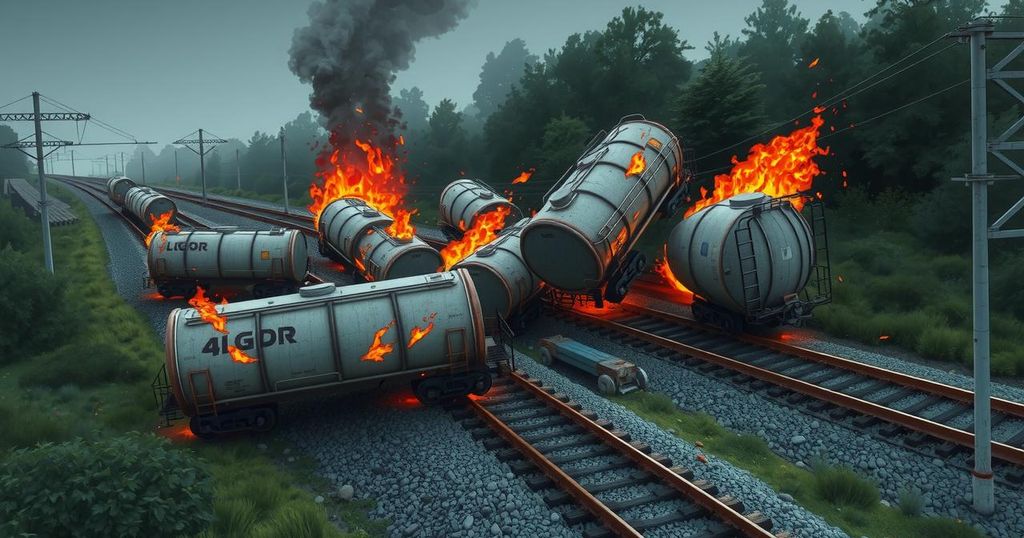Cuban Transport Minister Addresses Derailment Incident in Matanzas
Cuba’s Transport Minister Eduardo Rodríguez Dávila reacted to the recent train derailment in Matanzas, where five tanker cars of Tren Extra 924 derailed while transporting rum. Emergency protocols were initiated for passenger safety, and an investigation is underway. The incident reflects ongoing issues with railway infrastructure in Cuba, marking a rise in recent accidents and drawing government scrutiny.
Eduardo Rodríguez Dávila, Cuba’s Minister of Transportation, has addressed the recent train derailment incident in Matanzas, which has stirred significant disruption in railway services. This unfortunate accident happened at kilometer 80.500 of the Central Line near the Mocha station. It involved the Tren Extra 924, tasked with transporting rum from the “Meláneo Hernández” distillery to the rum factory located in Santa Cruz del Norte, Mayabeque. Five tanker cars derailed, with one overturning and igniting in flames, leading to extensive damage along approximately 100 meters of track.
In a post on Facebook, Rodríguez Dávila remarked that this incident is “something more than a railway accident.” He made his way to the site after receiving news of the event while supervising operations at the Havana Bay tunnel. Upon arrival, he quickly began evaluating the damage. He also emphasized that emergency protocols had been activated for the passengers affected by the derailment, including adjustments to train schedules such as the rescheduling of train No. 15 on the Havana to Holguín route and the temporary suspension of the Guantánamo to Havana train.
The Minister confirmed that an investigation is underway to uncover the circumstances that led to this derailment, and he expressed relief in the fact that there were no reported human casualties. This incident reflects a troubling pattern, as Cuba has seen several railway accidents in the past few months. For instance, in April 2025, a train on the Holguín-Havana route derailed in Las Tunas, although thankfully, no injuries occurred.
Before that, in December 2024, two freight trains collided in Sancti Spíritus, which resulted in an oil spill. Preliminary assessments pointed towards a breach of operational regulations as a significant factor. Additional derailments, including a passenger train in September and the Manzanillo-Havana train in August 2024, further underline the challenges facing Cuba’s railway system and safety protocols.
In summary, the Matanzas derailment has raised critical questions surrounding the maintenance and operational standards of Cuba’s railways. The incident has exacerbated existing concerns regarding infrastructure decay, which complicates not only passenger mobility but also goods transport. Moreover, it subjects the government to scrutiny over safety measures and infrastructure upkeep in the rail sector. Rodriguez Dávila’s remarks reflect an attempt to address these broader issues, highlighting ongoing investigations into the causes of these repeated mishaps.
In essence, the derailment of Tren Extra 924 in Matanzas has spotlighted serious concerns regarding Cuba’s railway infrastructure and safety oversight. As investigations begin, the absence of casualties is a small relief amid growing questions about operational failings that have led to a series of railway accidents. This incident could potentially lead to critical reviews of maintenance practices, safety protocols, and accountability within the transportation sector.
Original Source: en.cibercuba.com




Post Comment